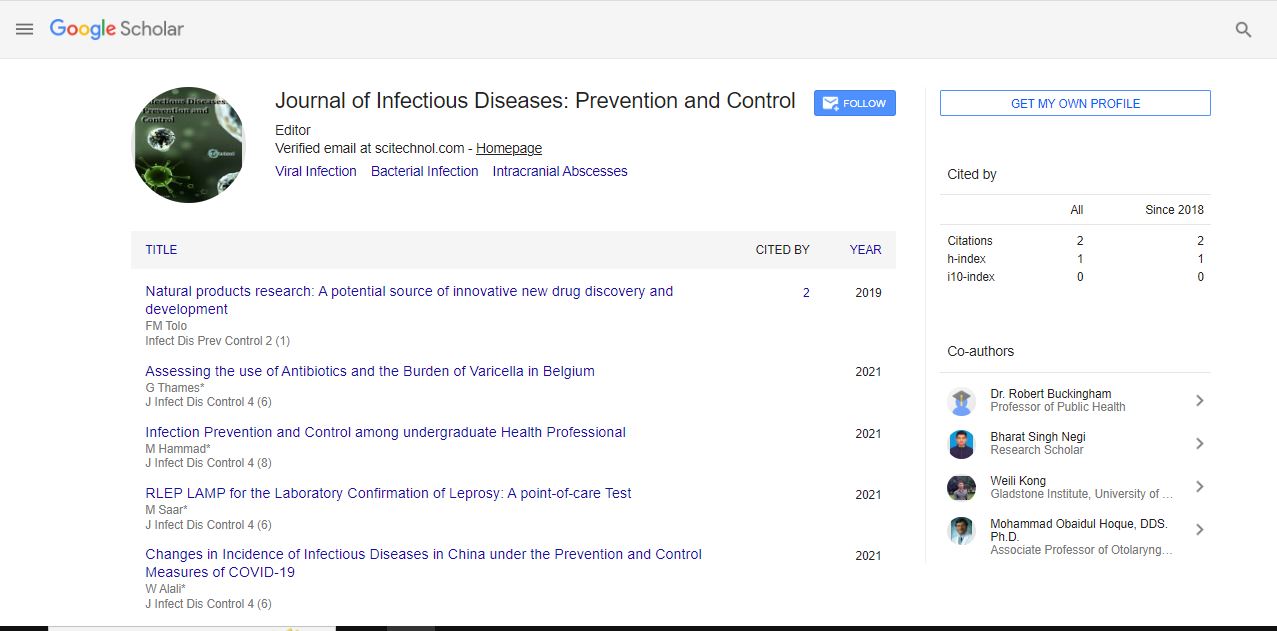Perspective, Infect Dis Prev Control Vol: 6 Issue: 4
Innovations in Immunity and the Impact of Immunological Sciences
Fabreti Corrie*
1Department of Clinical Neuroscience, University of Oulu, Oulu, Finland
*Corresponding Author: Fabreti Corrie,
Department of Clinical Neuroscience,
University of Oulu, Oulu, Finland
E-mail: fabrecorr@oulu.fi
Received date: 24 November, 2023, Manuscript No. IDPC-24-127260;
Editor assigned date: 27 November, 2023, Pre QC No. IDPC-24-127260 (PQ);
Reviewed date: 11 December, 2023, QC No. IDPC-24-127260;
Revised date: 18 December, 2023, Manuscript No. IDPC-24-127260 (R);
Published date: 26 December, 2023, DOI: 10.36648/idpc.6.4.149
Citation: Corrie F (2023) Innovations in Immunity and the Impact of Immunological Sciences. Infect Dis Prev Control 6:4.
Description
Immunological sciences have undergone a remarkable transformation in recent years, anticipating a new era of innovations that are reshaping the understanding of immunity. The foundation of innovations in immunity lies in a deeper understanding of the immune system, its components and the complex interactions. Molecular and cellular studies have identified the truth of immune responses, elucidating the roles of various cells, cytokines and signaling pathways in orchestrating an effective defense against pathogens. The discovery of both natural and modified immunity and the recognition of their collaborative efforts in safeguarding the body have been pivotal. Immunologists now appreciate the innovative ways in which these two arms of the immune systems work in collaboration with one another, providing a robust defense against a diverse array of pathogens.
Revolutionary technological advancements have significantly propelled the field of immunology. High-throughput sequencing, single-cell analysis and Clustered Regularly Interspaced Short Palindromic Repeats (CRISPR) gene-editing technologies have empowered analysts to explore the immune system at unprecedented resolutions. These tools have demonstrated the diversity among populations of immune cells, identified novel immune cell subsets and facilitated the mapping of complex immunological reaction networks. Genomics, proteomics and metabolomics, provide a comprehensive perspective of immune responses, enabling analysts to decipher the molecular signatures associated with health and disease. The integration of big data and bioinformatics has enhanced the ability to analyze complex immunological datasets, leading to more precise and personalized approaches to understanding immune function.
One of the most transformative innovations in immunology has been the development of immunotherapies. These interventions integrate the power of the immune system to customize and eliminate cancer cells, marking a paradigm shift in cancer treatment. Checkpoint inhibitors, adoptive T-cell therapies and cancer vaccines are among the pioneering immunotherapeutic approaches that have demonstrated unprecedented success in certain malignancies. Beyond cancer, immunotherapies are emerging as potential medical interventions for autoimmune diseases and chronic inflammatory conditions. By modulating immune responses, these therapies aim to restore balance to the immune system, providing new avenues for managing diseases with limited treatment options.
Vaccines, a cornerstone of preventive medicine, continue to evolve with innovative technologies. Advances in vaccine design, such as messenger Ribonucleic Acid (mRNA) and vector-based platforms have enabled the rapid development of vaccines against emerging infectious diseases. The COVID-19 pandemic witnessed the unprecedented speed at which mRNA vaccines were developed and deployed, demonstrating the possibilities of these innovative platforms. In addition to infectious diseases, analysts are exploring the potential of vaccines in addressing non-infectious conditions, including certain cancers and neurodegenerative disorders. The concept of therapeutic vaccines, designed to stimulate the immune system to customize specific disease-related antigens, has potential in revolutionizing treatment modalities.
The era of precision medicine has extended its reach into immunology, allowing for the customization of therapeutic interventions based on individual immune profiles. Biomarker discovery and immune profiling technologies enable clinicians to identify specific immune signatures associated with disease susceptibility, progression and response to treatment. Customizing immunotherapies to individual patients not only enhances treatment efficacy but also minimizes adverse effects. The concept of "immunological fitness" considers a person's unique immune status, genetic composition and environmental influences, paving the way for personalized immunological interventions.
Conclusion
While the innovations in immunology bring about unprecedented opportunities, they also pose challenges and ethical considerations. The high cost of some advanced immunotherapies raises concerns about accessibility and affordability. Additionally, the potential for unexpected consequences, such as immune-related adverse events, highlights the need for vigilant monitoring and ethical considerations in clinical applications. Innovations in immunity and the transformative impact of immunological sciences have propelled the field to unprecedented heights. From innovative applications to a greater comprehension of immunological processes in cancer treatment, infectious disease prevention and personalized medicine, immunology stands at the forefront of scientific progress.
 Spanish
Spanish  Chinese
Chinese  Russian
Russian  German
German  French
French  Japanese
Japanese  Portuguese
Portuguese  Hindi
Hindi 